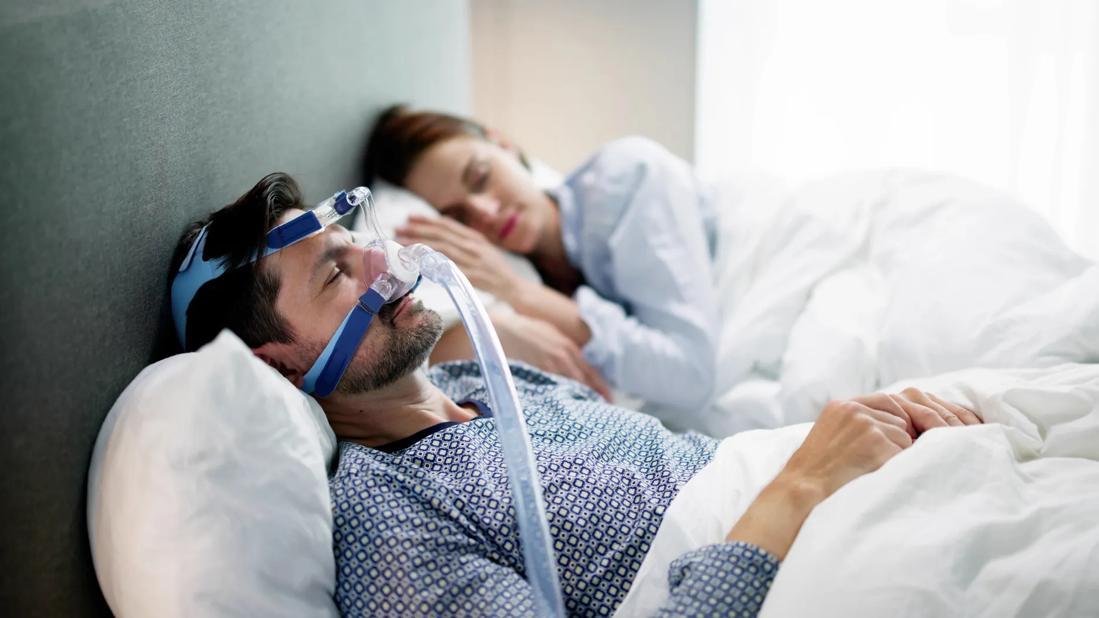It’s OK if congestion forces you to take a break from using this breathing device

Under normal circumstances, your CPAP machine works wonders on sleep apnea to help you breathe and rest comfortably. But right now, you’ve got a stuffy nose — and it’s a struggle to get any air through all that gunk.
Advertisement
Cleveland Clinic is a non-profit academic medical center. Advertising on our site helps support our mission. We do not endorse non-Cleveland Clinic products or services. Policy
So, can your CPAP (continuous positive airway pressure) machine still help you catch some ZZZs despite that nasal congestion? Or will it make you feel worse?
Let’s get some answers from otolaryngologist Alan Kominsky, MD.
When airways function normally, a CPAP, or other PAP (positive airway pressure) machine, can easily push pressurized air through those passages and into your lungs so you get the oxygen you need.
That situation changes when you’re stuffed up, says Dr. Kominsky.
Congestion from the common cold or other infections typically brings inflammation to your sinuses and nasal passageways. This swelling narrows your airways, making it more difficult to breathe.
Your immune system’s buildup of mucus — aka, snot — doesn’t help the cause either.
“When people have colds, there’s just not enough room to breathe,” he explains. “So, if you use a CPAP machine, you just feel a lot of push from the air but it doesn’t have a lot of places to go because of the swelling and narrowing of your airways.”
That forced push of air into your nose (or nose and mouth) also can further irritate airways that already aren’t feeling great, making you feel even worse.
Wearing a mask and using a PAP device in bed while congested can be uncomfortable, to say the least. It may worsen your cough or dial up your sinus pressure. (Who knew that was even possible, right?)
Advertisement
Under the circumstances, your best choice may be to set the machine aside until you feel better.
“Typically, you want consistency with using your CPAP machine,” states Dr. Kominsky. “But if you can’t tolerate it because you’re sick, it’s OK to take a break until you take care of your congestion.”
Some other examples of when you may want to take a break from using your CPAP and other PAP devices include:
A CPAP machine may help clear stuffiness in certain situations to make you feel better.
“If your illness is on the mild side, just putting the CPAP on and having that pressure from the air can sometimes help get rid of your congestion,” explains Dr. Kominsky.
Increasing the temperature of your CPAP’s humidifier and using heated tubing may also provide relief for nose and throat symptoms. (Most modern PAP devices have a built-in humidifier and the ability to increase humidity and temperature.)
If you use your CPAP while battling a cold and stuffiness, Dr. Kominsky suggests repositioning your body so your head is higher than your heart. Propping yourself up with two pillows usually does the trick.
“This will allow the fluids and blood to drain from the structures of your nose and get some natural decongestion,” he notes.
Make sure to clean your CPAP machine between uses so icky germs don’t linger, too.
If you use a CPAP machine in bed to address sleep apnea, you know how important it is for a good night’s sleep. So, if stuffiness from a cold threatens to take it away … well, put some extra effort into treating that congestion.
Potential at-home solutions to manage inflammation and open your airways include:
“The tips for breathing with a cold are the same whether or not you have a PAP device,” clarifies Dr. Kominsky. “So, focus on taking care of the congestion. Once that’s gone, everything can go back to normal.”
Advertisement
Learn more about our editorial process.
Advertisement

A clean CPAP machine can help you sleep and breathe better

They can feel similar, but the differences matter — especially if you’re at higher risk for complications

‘Walking pneumonia’ is milder and doesn’t always require medication — but it’s also highly contagious

This spinning sensation is a symptom, not a condition, so you need to know what’s causing it before you can treat it

They’re viral cousins, but enteroviruses are more likely to cause serious illness

This fruit has clear nutritional benefits — but there’s little evidence it can prevent or treat illness

If your nose is constantly running, it could be allergies, chronic sinusitis, nasal polyps or other concerns

Honey can help relieve a cough by lowering inflammation in your airways and loosening up mucus

Wearing a scarf, adjusting your outdoor activities and following your asthma treatment plan can help limit breathing problems

Your diet in the weeks, days and hours ahead of your race can power you to the finish line

When someone guilt trips you, they’re using emotionally manipulative behavior to try to get you to act a certain way